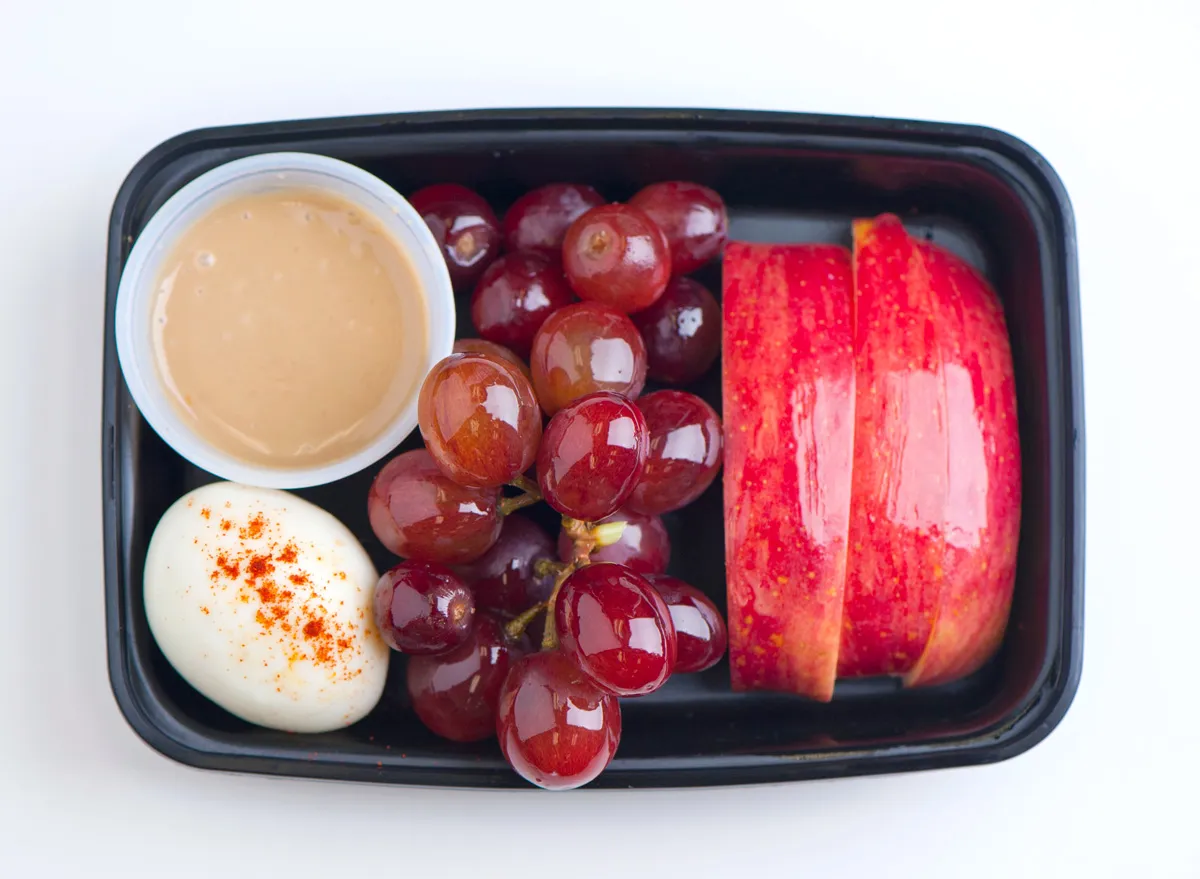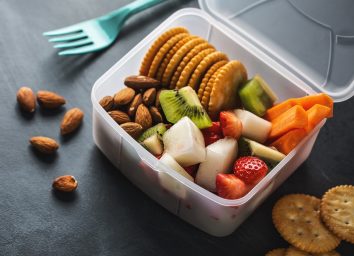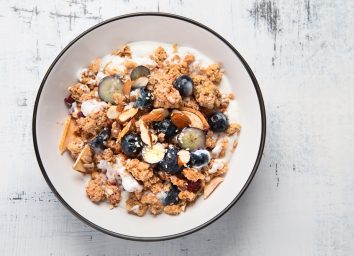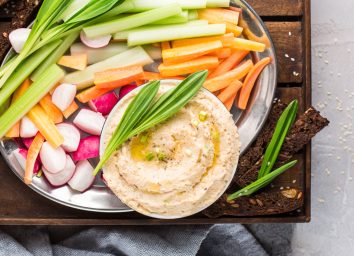This Is the Only Way To Snack and Lose Weight, Say Experts

Do you love snacking? Grocery shelves sure are packed with delicious looking snacks—some healthier than others—and it can be tempting to fill up your cart with them. Yet while there’s nothing wrong with stocking your pantry with some healthy snacks, numerous registered dietitians and doctors actually say it’s healthier to treat your snacks like a meal.
Yes, really. Instead of mindlessly snacking on a bag of chips, prepare yourself a small meal to go with it. Why? Because you’ll actually feel full after, and inevitably, not eat more which causes weight gain.
Here’s why you should start prepping meals for your snacks from the experts, and if you’re looking for even more healthy eating tips, be sure to check out our list of 21 Best Healthy Cooking Hacks of All Time.
Make sure snacks include the magical three.
By the magical three, we mean protein, fats, and carbs. Why? Because these are the three macronutrients that can help round out your meal and keep you feeling full for a longer period of time. It’s also important to incorporate fiber into your snack, which is another key component for feeling satiated and for helping you to lose weight.
“I recommend snacks have a mixture of high fiber carbohydrate, fat, and protein in order to provide satiation and fulfill hunger,” says Talia Hauser, RD, LDN. “Fiber, fat, and protein all work together to do this. Types of snacks that fit this [include] a piece of fruit and nuts, whole-grain crackers with nut butter, vegetables with hummus dip, string cheese with whole-grain crackers, whole-grain toast with avocado, and Greek yogurt with berries.”
Avoiding these key nutrients would result in a “naked” snack, according to Pam Fullenweider, RD, MS of Fully Mediterranean.
“A lot of people turn to chips or crackers as a snack but these foods are primarily made up of carbohydrates,” says Fullenweider. “When we eat ‘naked’ carbohydrates or carbohydrates without protein or fat, our blood sugar spikes and crashes shortly after. This crash in blood sugar drives us to seek out more carbohydrates to raise blood sugar. This cycle can be very hard to break!”
Choose a time to eat your snack.
When to eat your snack is also important, because it can help eliminate any crazy blood sugar spikes or dips that can happen if you’re snacking throughout the day. If you’re choosing to make your snack a mini-meal, then you should time it just like you would for breakfast, lunch, and dinner.
“Snacks are an essential part of a healthy balanced diet,” says Jean Hanks, MS, RDN, CDN from Bethany Medical Clinic of NY. “It’s a good idea to eat every 3 to 4 hours to keep blood sugars stable, which not only prevents hunger-related crankiness (‘hanger’) but can help prevent overeating at the next meal. So ideally, you would have a snack between breakfast and lunch, and between lunch and dinner.”
Pick a time that you feel hungry during the day. Maybe it’s the long drag between lunch and dinner or the time you have between breakfast and lunch. If you’re not sure the best time to eat a snack during your day, Hauser recommends using a hunger scale to figure out what times are the right ones for you to have your mini-meal.
“I recommend using a hunger scale between 1 (not hungry) and 10 (ravenous), in general one should eat when they are around 4 to 6,” says Hauser. “If you find yourself snacking at 1 to 2, you might just be bored or eating thoughtlessly. Get in tune with your hunger cues.”
Set up a plate—and leave the bag alone.
While it’s tempting to snack right out of the bag, it doesn’t promote healthy portion control for your diet. Instead, set up an actual plate as you would for your other meals of the day, filling it with all of those proper macronutrients, and put the open bag of chips or crackers back in the pantry.
“Be sure to not eat out of a package as it can lead to overeating and mindless snacking,” says Hauser. “Grab a handful or scoop, put it on a plate, and eat that. Give yourself a few minutes after eating to see if you are still hungry before going back for more.”
And actually take the time to enjoy it! Give yourself a small break during that snack time to sit down and enjoy the meal, instead of falling prey to any mindless snacking.
“One reason snacking gets a bad rap is because of mindless munching and lack of portion control,” says Dr. Tonya Sweezer, DO, ND. “We are often snacking because we don’t have time for a full meal, so we are too distracted to keep track of our intake.”
A few snack “meals” you can have during the day.
Once you’ve established when to have your healthy snack during the day, take some time to plan—or even meal prep—your snacks for the week, just like you would with any other meal.
Here are a few of the ideas shared by the experts we spoke with:
- Fruit and cheese
- Whole grain bread with peanut butter
- Greek yogurt with fruit
- Hummus and vegetables
- Hard-boiled eggs with whole-wheat crackers
Or try one of these 50 Healthy Snack Ideas to Keep You Slim.
Don’t have time to prep? Edie Reads, RD and chief editor at Health Advise, even recommends getting creative with your leftovers if you don’t have time to cook something.
“Leftovers can make excellent snacks,” says Reads. “For instance, that whole-grain toast slice you left during breakfast can serve as an excellent snack. Similarly, some low-sugar granola, tuna salad, soup, and stir-fried vegetables are excellent snacks.”
It’s also important to pair your snack with fluids as well.
“I also recommend pairing your healthy snack with a cup of fluid —water first for hydration or try herbal tea or flavored sparkling water,” says Leah Van Dolder, BScFN, RD. “Getting into the habit of having healthy snacks on hand helps to keep our energy levels up, our blood sugars stable, and prevents that afternoon dip in focus and productivity.”
Now that you know the type of snack to throw together, you’ll want to incorporate these 7 Healthy Snacking Habits into your daily routine as well.








